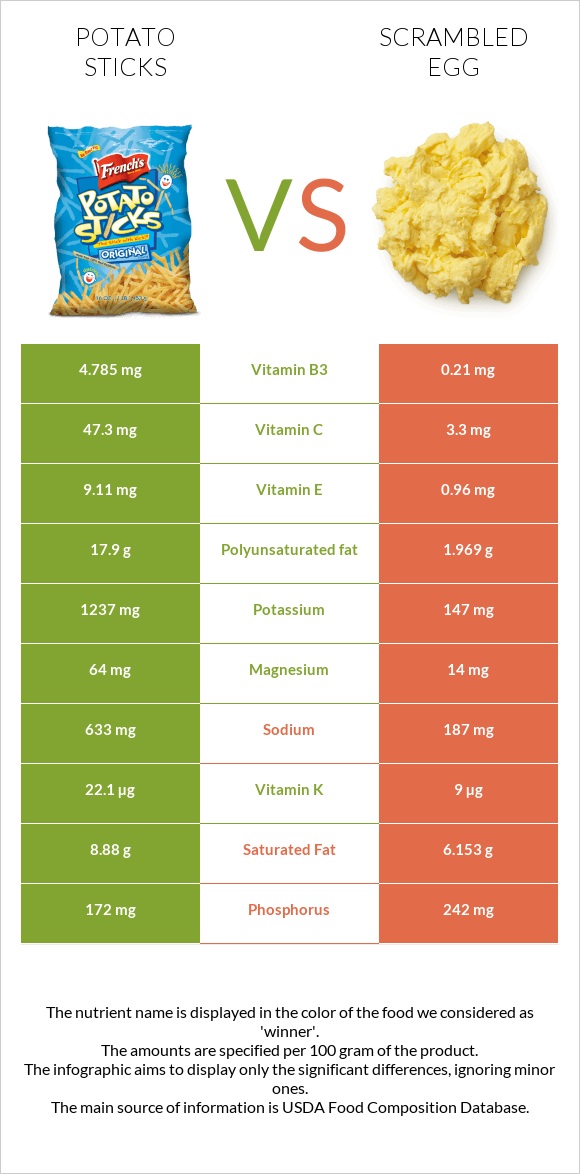Potato sticks vs. Scrambled egg — In-Depth Nutrition Comparison
Compare
Summary of differences between potato sticks and scrambled egg
- Potato sticks have more vitamin E, vitamin C, potassium, vitamin B3, and copper; however, scrambled egg is higher in vitamin B12, vitamin B2, choline, and selenium.
- Scrambled egg covers your daily need for cholesterol, 142% more than potato sticks.
- Potato sticks have 23 times more vitamin B3 than scrambled egg. While potato sticks have 4.785mg of vitamin B3, scrambled egg has only 0.21mg.
These are the specific foods used in this comparison Snacks, potato sticks and Fast foods, egg, scrambled.
Infographic

Infographic link
Mineral Comparison
Mineral comparison score is based on the number of minerals by which one or the other food is richer. The "coverage" charts below show how much of the daily needs can be covered by 300 grams of the food.
| Contains more MagnesiumMagnesium | +357.1% |
| Contains more PotassiumPotassium | +741.5% |
| Contains more CopperCopper | +370.1% |
| Contains more ManganeseManganese | +883.7% |
| Contains more CalciumCalcium | +216.7% |
| Contains more IronIron | +14.1% |
| Contains more ZincZinc | +67.7% |
| Contains more PhosphorusPhosphorus | +40.7% |
| Contains less SodiumSodium | -70.5% |
| Contains more SeleniumSelenium | +177.8% |
Vitamin Comparison
Vitamin comparison score is based on the number of vitamins by which one or the other food is richer. The "coverage" charts below show how much of the daily needs can be covered by 300 grams of the food.
| Contains more Vitamin CVitamin C | +1333.3% |
| Contains more Vitamin EVitamin E | +849% |
| Contains more Vitamin B1Vitamin B1 | +20% |
| Contains more Vitamin B3Vitamin B3 | +2178.6% |
| Contains more Vitamin B6Vitamin B6 | +68.4% |
| Contains more Vitamin KVitamin K | +145.6% |
| Contains more FolateFolate | +37.9% |
| Contains more Vitamin AVitamin A | +∞% |
| Contains more Vitamin DVitamin D | +∞% |
| Contains more Vitamin B2Vitamin B2 | +348.3% |
| Contains more Vitamin B5Vitamin B5 | +133.3% |
| Contains more Vitamin B12Vitamin B12 | +∞% |
All nutrients comparison - raw data values
| Nutrient |  |
 |
DV% diff. |
| Cholesterol | 0mg | 426mg | 142% |
| Polyunsaturated fat | 17.9g | 1.969g | 106% |
| Vitamin E | 9.11mg | 0.96mg | 54% |
| Vitamin C | 47.3mg | 3.3mg | 49% |
| Vitamin B12 | 0µg | 1.01µg | 42% |
| Potassium | 1237mg | 147mg | 32% |
| Vitamin B2 | 0.116mg | 0.52mg | 31% |
| Vitamin B3 | 4.785mg | 0.21mg | 29% |
| Fats | 34.4g | 16.18g | 28% |
| Copper | 0.315mg | 0.067mg | 28% |
| Selenium | 8.1µg | 22.5µg | 26% |
| Choline | 34.9mg | 180.6mg | 26% |
| Vitamin A | 0µg | 176µg | 20% |
| Sodium | 633mg | 187mg | 19% |
| Carbs | 53.3g | 2.08g | 17% |
| Manganese | 0.423mg | 0.043mg | 17% |
| Calories | 522kcal | 212kcal | 16% |
| Protein | 6.7g | 13.84g | 14% |
| Fiber | 3.4g | 0g | 14% |
| Magnesium | 64mg | 14mg | 12% |
| Saturated fat | 8.88g | 6.153g | 12% |
| Vitamin B5 | 0.403mg | 0.94mg | 11% |
| Vitamin K | 22.1µg | 9µg | 11% |
| Phosphorus | 172mg | 242mg | 10% |
| Vitamin B6 | 0.32mg | 0.19mg | 10% |
| Vitamin D | 0 IU | 46 IU | 6% |
| Zinc | 0.99mg | 1.66mg | 6% |
| Vitamin D | 0µg | 1.1µg | 6% |
| Calcium | 18mg | 57mg | 4% |
| Iron | 2.27mg | 2.59mg | 4% |
| Folate | 40µg | 29µg | 3% |
| Vitamin B1 | 0.096mg | 0.08mg | 1% |
| Monounsaturated fat | 6.16g | 5.889g | 1% |
| Net carbs | 49.9g | 2.08g | N/A |
| Sugar | 0.22g | 1.64g | N/A |
| Tryptophan | 0.212mg | 0% | |
| Threonine | 0.657mg | 0% | |
| Isoleucine | 0.836mg | 0% | |
| Leucine | 1.185mg | 0% | |
| Lysine | 0.913mg | 0% | |
| Methionine | 0.427mg | 0% | |
| Phenylalanine | 0.75mg | 0% | |
| Valine | 0.96mg | 0% | |
| Histidine | 0.325mg | 0% |
Macronutrient Comparison
Macronutrient breakdown side-by-side comparison
Protein:
6.7 g
Fats:
34.4 g
Carbs:
53.3 g
Water:
2.2 g
Other:
3.4 g
Protein:
13.84 g
Fats:
16.18 g
Carbs:
2.08 g
Water:
66.7 g
Other:
1.2 g
| Contains more FatsFats | +112.6% |
| Contains more CarbsCarbs | +2462.5% |
| Contains more OtherOther | +183.3% |
| Contains more ProteinProtein | +106.6% |
| Contains more WaterWater | +2931.8% |
Fat Type Comparison
Fat type breakdown side-by-side comparison
Saturated fat:
Sat. Fat
8.88 g
Monounsaturated fat:
Mono. Fat
6.16 g
Polyunsaturated fat:
Poly. Fat
17.9 g
Saturated fat:
Sat. Fat
6.153 g
Monounsaturated fat:
Mono. Fat
5.889 g
Polyunsaturated fat:
Poly. Fat
1.969 g
| Contains more Poly. FatPolyunsaturated fat | +809.1% |
| Contains less Sat. FatSaturated fat | -30.7% |
~equal in
Monounsaturated fat
~5.889g





